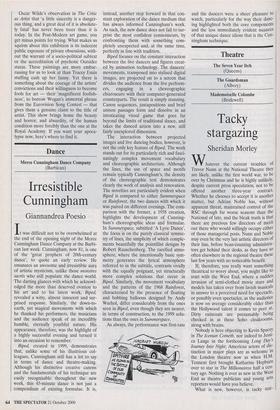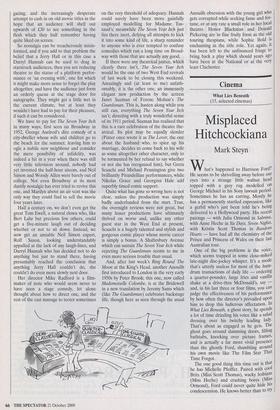Theatre
The Seven Year Itch (Queens) The Guardsman (Albery) Mademoiselle Colombe (Bridcwcll)
Tacky stargazing
Sheridan Morley
Whatever the current troubles of Trevor Nunn at the National Theatre they are likely, unlike the first world war, to be over by Christmas and he is highly unlikely, despite current press speculation, not to be offered another three-year contract. Whether he chooses to accept it is another matter, but Adrian Noble has, without apparent threat, maintained control of the RSC through far worse seasons than the National of late, and the bleak truth is that there are precious few directors of merit out there who would willingly occupy either of those managerial posts. Nunn and Noble may even be the very last artistic directors of their line, before bean-counting administra- tors get behind their desks, as they have so often elsewhere in the regional theatre these last few years with no noticeable benefit.
If, therefore, you really want something theatrical to worry about, you might like to start with the West End, where a sudden invasion of semi-clothed movie stars and models has taken over from lavish musicals in answer to a perceived need for spectacle, or possibly even spectacles, as the audience is now on average considerably older than the Hollywood talent it comes to peer at. Dirty raincoats are presumably being checked in at these Soho cloakrooms, along with brains.
Nobody is here objecting to Kevin Spacey in The Iceman Cometh, nor indeed to Jessi- ca Lange in the forthcoming Long Day's Journey Into Night; American actors of dis- tinction in major plays are as welcome in the London theatre now as when H.M• Tennent first brought Katharine Hepburn over to star in The Millionairess half a cen- tury ago. Nothing is ever as new in the West End as theatre publicists and young arts reporters would have you believe.
What is new, however, is tacky star- gazing, and the increasingly desperate attempt to cash in on old movie titles in the hope that an audience will shell out upwards of £30 to see something in the flesh which they half remember having quite liked on screen.
So nostalgia can be treacherously misin- formed, and if you add to that problem the belief that a Jerry Hall or in this case a Darryl Hannah can be used to drag in starstruck audiences, then you are reducing theatre to the status of a platform perfor- mance or 'an evening with', one for which it might make more sense to forget the play altogether, and have the audience just form an orderly queue at the stage door for autographs. They might get a little wet in the current climate, but at least they wouldn't have had to pay for their pleasure, if such it can be considered.
We have to pay for The Seven Year Itch in many ways; first seen on Broadway in 1952, George Axelrod's dire comedy of a city-dweller whose wife and children go to the beach for the summer, leaving him to ogle a nubile new neighbour and consider the mere possibility of infidelity, was indeed a hit in a year when there was still very little television around, nobody had yet invented the half-hour sitcom, and Neil Simon and Woody Allen were barely out of college. Not even Broadway at its most dustily nostalgic has ever tried to revive this one, and Marilyn above an air vent was the only way they could find to sell the movie four years later.
Half a century on, we 'don't even get the great Tom Ewell, a natural clown who, like Bert Lahr but precious few others, could get a five-minute laugh out of deciding whether or not to sit down. Instead, we now get an amiable Neil Simon expert, Rolf Saxon, looking understandably appalled at the lack of any laugh-lines, and Darryl Hannah who has decided not to do anything but just to stand there, having presumably reached the conclusion that anything Jerry Hall couldn't do, she couldn't do even more slowly next door.
Her director Mike Radford is a film- maker of note who would seem never to have seen a stage comedy, let alone thought about how to direct one, and the rest of the cast manage to teeter sometimes on the very threshold of adequacy. Hannah could surely have been more gainfully employed modelling for Madame Tus- saud's; meanwhile The Seven Year Itch just lies there inert, defying all attempts to kick it into some kind of life, a sharp reminder to anyone who is ever tempted to confuse comedies which ran a long time on Broad- way with those that are actually any good.
If there were any theatrical justice, which clearly there isn't, The Seven Year Itch would be the one of two West End revivals of last week to be closing this weekend. Amazingly and (at least to me) unfath- omably, it is the other one, an immensely elegant new production by the actress Janet Suzman of Ferenc Molnar's The Guardsman. This is, hasten along while you still can, everything The Seven Year Itch isn't; directing with a truly wonderful sense of its 1911 period, Suzman has realised that this is a rare celebration of the theatre the- atrical. Its plot may be equally slender (Pinter once wrote it as The Lover, the one about the husband who, to spice up his marriage, decides to come back to his wife as some altogether other character, only to be tormented by her refusal to say whether or not she has recognised him), but Greta Scaachi and Michael Pennington give two brilliantly Pirandellian performances, while Nikolas Grace and Georgina Hale add superbly timed comic support.
Quite what has gone so wrong here is not clear, unless the production was simply badly underfunded from the start. True, the overnight reviews were not great, but many lesser productions have ultimately thrived on worse and, unlike any other guest star in the West End at present, Scaachi is a hugely talented and stylish and gorgeous comic player whose movie career is simply a bonus. A Shaftesbury Avenue which can sustain The Seven Year Itch while rejecting The Guardsman seems to me in even more serious trouble than usual.
And, after last week's Ring Round The Moon at the King's Head, another Anouilh first introduced to London in the very early 1950s by Peter Brook; this one, now called Mademoiselle Colombe, is at the Bridewell in a new translation by Jeremy Sams which (like The Guardsman) celebrates backstage life, though here as seen through the usual Anouilh obsession with the young girl who gets corrupted while seeking fame and for- tune, or at any rate a small role in her local theatre. Honor Blackman and Donald Pickering are in fine fruity form as the old touring thespians, while Sophie Bold is enchanting in the title role. Yet again, it has been left to the unfinanced fringe to bring back a play which should years ago have been at the National or at the very least Chichester.


























































































 Previous page
Previous page